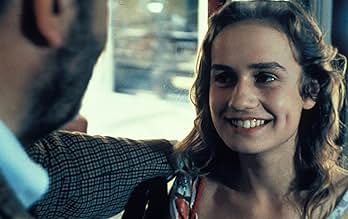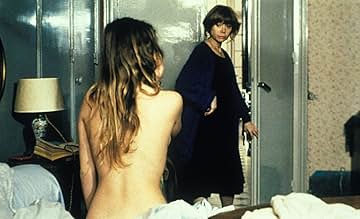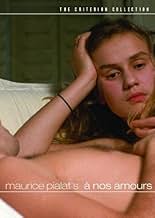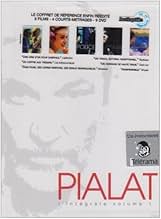AVALIAÇÃO DA IMDb
7,1/10
7,5 mil
SUA AVALIAÇÃO
A família de uma jovem errática tenta desesperadamente impedir seus modos cada vez mais eróticos.A família de uma jovem errática tenta desesperadamente impedir seus modos cada vez mais eróticos.A família de uma jovem errática tenta desesperadamente impedir seus modos cada vez mais eróticos.
- Direção
- Roteiristas
- Artistas
- Prêmios
- 4 vitórias e 3 indicações no total
- Direção
- Roteiristas
- Elenco e equipe completos
- Produção, bilheteria e muito mais no IMDbPro
Avaliações em destaque
For many, the lack of a defined storyline is maddening, often resulting in a less than satisfying experience. Almost stream-of-consciousness in its approach, Maurice Pialat's À Nos Amours does not appear to have much story structure, but the story is most definitely there and is related with a subtlety not often found in modern film.
Bonnaire's portrayal of Susanne is brilliant (as others have said), and her almost wistful sadness permeates the performance. In one scene, her father (played by Pialat) says, "You never smile anymore," indicating the transformation of Susanne from innocence to experience. The men in her life are shown only for the time she is with them. There is neither introduction upon their arrival nor explanation as to their departure. Pialat uses this method to show Susanne's lack of emotional investment in these temporary romances.
The only men who do return are her father, her brother, and Luc, her one real love. It is when she is with these men that she shows her true self, rather than the detached uncaring girl who sleeps around in an effort to replace them. The dialogue drives this film. There is little music, save the inspired use of Klaus Nomi's "The Cold Song". The sad wailing of Nomi's pseudo-operatic vocal against the opening credits of Susanne in the pulpit of a boat is a wonderful moment.
Long out of print, this film is now available on DVD. It is deserving of a look by the discerning cinephile who may have missed it 25 years ago.
Bonnaire's portrayal of Susanne is brilliant (as others have said), and her almost wistful sadness permeates the performance. In one scene, her father (played by Pialat) says, "You never smile anymore," indicating the transformation of Susanne from innocence to experience. The men in her life are shown only for the time she is with them. There is neither introduction upon their arrival nor explanation as to their departure. Pialat uses this method to show Susanne's lack of emotional investment in these temporary romances.
The only men who do return are her father, her brother, and Luc, her one real love. It is when she is with these men that she shows her true self, rather than the detached uncaring girl who sleeps around in an effort to replace them. The dialogue drives this film. There is little music, save the inspired use of Klaus Nomi's "The Cold Song". The sad wailing of Nomi's pseudo-operatic vocal against the opening credits of Susanne in the pulpit of a boat is a wonderful moment.
Long out of print, this film is now available on DVD. It is deserving of a look by the discerning cinephile who may have missed it 25 years ago.
10bob998
Let me get it off my chest now: I'm very disappointed in the lack of notice given Pialat's films. Why am I only the fifth person to review À nos amours, and not the 500th? This is the sixth feature by Pialat, and it is a masterpiece. The travails of Suzanne and her family have universal implications; if you think only of her relations with her brother Robert--violent at times, yet often tender and half-incestuous--that's enough material for a film in itself. Some people are bothered by the promiscuous nature of Suzanne's love life, how she just doesn't behave like a regular teenage girl should. I have met a girl like her.
About two-thirds of the way through, we are confronted with a scene of astonishing virtuosity: the party at the family home, into which erupts the absent father, played by Pialat himself. The script the actors had been given gave no notice of this plot turn; it is fascinating to watch eight actors dealing with this incredible event--no one blows the scene, no matter how dumbfounded they must have been. For about ten minutes, we get pure acting, or reacting, however you want to put it. This is the kind of film event that makes movies worthwhile.
Bonnaire is tremendous, it's one of the greatest debuts in film history. Pialat as the father is great, all the more remarkable in that he had never acted before. The dimple scene is wonderful. Dominique Besnehard has to bring off an unsympathetic role as the brother, and he performs very well.
About two-thirds of the way through, we are confronted with a scene of astonishing virtuosity: the party at the family home, into which erupts the absent father, played by Pialat himself. The script the actors had been given gave no notice of this plot turn; it is fascinating to watch eight actors dealing with this incredible event--no one blows the scene, no matter how dumbfounded they must have been. For about ten minutes, we get pure acting, or reacting, however you want to put it. This is the kind of film event that makes movies worthwhile.
Bonnaire is tremendous, it's one of the greatest debuts in film history. Pialat as the father is great, all the more remarkable in that he had never acted before. The dimple scene is wonderful. Dominique Besnehard has to bring off an unsympathetic role as the brother, and he performs very well.
A perfect example which illustrates why being truth to life sometimes doesn't often equal great movies. Maurice Pialat wasn't completely truthful in its depiction of youth's shallowness but he isn't completely off mark, just a few objectionable things that look bizarre, too exploitative or unbelievable. But that's life sometimes. "À Nos Amours" ("To Our Loves") focus is a teenage girl (Sandrine Bonnaire) and the way she conducts her sexual relationships, first with a boyfriend, the good hearted Luc (Cyr Boitard), and later evolves to sometimes mindless, sometimes affectionate casual encounters with other guys. Almost fine if it wasn't for her family bothering with this, and a somewhat unpredictable disintegration when her father (Pialat) decides to leave the family. What spirals after that is an emotional roller-coaster with the infatuated girl being a victim of constant reprehension and beatings from her older brother, now head of the family, and the mother who seems to be rotting away into madness, not knowing how to cope with everything happening around her. And there's plenty of time for her dedicate some time with her lovers, miserable for not getting the love she deserves.
One goes through this with plenty of expectations and interest but one walks out with plenty of reservations and little gain. C'mon, this was made in 1980's and you're telling me that even back then, in such a bourgeoisie family, allegedly cultured, they treat the typical adolescent behavior in that horrid way? With punches, yells and stuff? I would expect this in a poorer background. Everything's so over-the-top, so forced, very off-putting. The movie seems to suggest that there's something going on between father and daughter and also between brother and sister, just suggest some incestuous relations but never goes into that deep.
What Pialat captured with some excellency was youth's boredom, trying everything to escape from the usual routine of schools, classmates, and dealing with parents; youth's incapacity to love or find love, or using such as something to pass the time, not knowing what love truly means, going from one relationship to another, desperate to find something new that may cure them from their boredom and apathy towards life. This is clearly evidenced in the scene where the girl has an one night stand with an English sailor. She had her fun, experienced something great but she doesn't show much after the fact, a little worried because she cheated on her boyfriend. It isn't a first rate portrayal, obviously, but it's far more realistic than the other topics already mentioned (the family matters). The movie strangely went absurd towards the ending, giving unexplainable solutions and the strange return of the father.
I enjoyed this movie, enjoyed its good pace, it makes you interested with the very few it has to share. A little saddening that it wasn't all that much of a good film as a Cesar Award winner should be. Bonnaire, in one of her earliest roles, has plenty of qualities despite the relative lack of expression her character has, constantly down, sad, beaten. Far from being the great French cinema but beautiful to look at. 6/10
One goes through this with plenty of expectations and interest but one walks out with plenty of reservations and little gain. C'mon, this was made in 1980's and you're telling me that even back then, in such a bourgeoisie family, allegedly cultured, they treat the typical adolescent behavior in that horrid way? With punches, yells and stuff? I would expect this in a poorer background. Everything's so over-the-top, so forced, very off-putting. The movie seems to suggest that there's something going on between father and daughter and also between brother and sister, just suggest some incestuous relations but never goes into that deep.
What Pialat captured with some excellency was youth's boredom, trying everything to escape from the usual routine of schools, classmates, and dealing with parents; youth's incapacity to love or find love, or using such as something to pass the time, not knowing what love truly means, going from one relationship to another, desperate to find something new that may cure them from their boredom and apathy towards life. This is clearly evidenced in the scene where the girl has an one night stand with an English sailor. She had her fun, experienced something great but she doesn't show much after the fact, a little worried because she cheated on her boyfriend. It isn't a first rate portrayal, obviously, but it's far more realistic than the other topics already mentioned (the family matters). The movie strangely went absurd towards the ending, giving unexplainable solutions and the strange return of the father.
I enjoyed this movie, enjoyed its good pace, it makes you interested with the very few it has to share. A little saddening that it wasn't all that much of a good film as a Cesar Award winner should be. Bonnaire, in one of her earliest roles, has plenty of qualities despite the relative lack of expression her character has, constantly down, sad, beaten. Far from being the great French cinema but beautiful to look at. 6/10
This is the story of a teenage French girl (Sandrine Bonnaire) with a difficult home life. Both her father (who abandons the family) and her older brother (who regularly physically assaults her) seem to have an unnatural interest in her sexuality, while her mother (who may the worst of them all) is a raving hysteric who eggs everyone else on. Not surprisingly, the girl is quite promiscuous, availing herself of any number of boys and men. In an American movie like this, her male paramours would at best be panting dogs and at worst villainous cads taking advantage of a vulnerable girl, but here they're probably the most sympathetic people in the movie!
The young girl is not unsympathetic by any means, but she simply refuses to be a victim and remains firmly in control, and no family member or lover ultimately seems to have much chance against her. She is similar to the kind of "feminist lolitas" that often appear in Catherine Breillat movies like "A Real Young Girl" and "36 Fillete"-- teen girls that are very desirable, but also wise beyond their years and in perfect control of their own sexuality, and thus never simply mere sex objects. It's surprising Bonnaire never worked directly with Breillat because she is a much more self-assured and commanding actress than any of the ones Breillat did work with. I don't know if I believe the IMDb dates regarding Bonnaire's age as her assured acting (and her nude body) suggest that she was somewhat older than the character she's playing here, but she's very impressive regardless. Interestingly, while she became a very formidable actress in her later years (especially in films like Claude Chabrol's "Initiation"), she would not really be one of your more glamorous and sexy French actress. She certainly compares well to her contemporaries at the time like Emmanuelle Beart and Sophie Marceau, but while they would become leading ladies, she stayed more of a character actress.
Ironically, the one problem I had with the movie is that Bonnaire and her character is perhaps TOO self-assured and as an actress Bonnaire tends to dominate the rest of the cast too much. It might be a feminist statement to have young female protagonist who is this self-confident, but I don't know that it's necessarily very realistic.
The young girl is not unsympathetic by any means, but she simply refuses to be a victim and remains firmly in control, and no family member or lover ultimately seems to have much chance against her. She is similar to the kind of "feminist lolitas" that often appear in Catherine Breillat movies like "A Real Young Girl" and "36 Fillete"-- teen girls that are very desirable, but also wise beyond their years and in perfect control of their own sexuality, and thus never simply mere sex objects. It's surprising Bonnaire never worked directly with Breillat because she is a much more self-assured and commanding actress than any of the ones Breillat did work with. I don't know if I believe the IMDb dates regarding Bonnaire's age as her assured acting (and her nude body) suggest that she was somewhat older than the character she's playing here, but she's very impressive regardless. Interestingly, while she became a very formidable actress in her later years (especially in films like Claude Chabrol's "Initiation"), she would not really be one of your more glamorous and sexy French actress. She certainly compares well to her contemporaries at the time like Emmanuelle Beart and Sophie Marceau, but while they would become leading ladies, she stayed more of a character actress.
Ironically, the one problem I had with the movie is that Bonnaire and her character is perhaps TOO self-assured and as an actress Bonnaire tends to dominate the rest of the cast too much. It might be a feminist statement to have young female protagonist who is this self-confident, but I don't know that it's necessarily very realistic.
15-year old Suzanne (Sandrine Bonnaire) is a precocious child, living with her mother, her career-driven brother, and her sometimes overbearing father (played by Maurice Pialat). She has recently split from her boyfriend and is intent on moving from man to man in search of sexual pleasures and guardianship. When her father splits from her mother and moves out, home life becomes unbearable as her mother and brother disapprove of her lifestyle. She is most comfortable in the arms of a man, be it one of her seducers or her father. Men seems to flock to her, as she is pretty, charming and is happy to accommodate her admirers.
This is the second film that I've seen directed by French master Maurice Pialat, the other being the excellent L'Enfance Nue. They are both similar films in terms of themes and execution, and tell the familiar coming-of-age story from an original perspective. Whereas the former was a sledgehammer portrayal of a young juvenile causing havoc amongst the various foster homes he was placed, where redemption never seems possible, A Nos Amours' Suzanne is a more sympathetic lead character, and her journey is portrayed in a more subtle manner. While it would be shocking to hear of a 15 year old girl bedding a number of men, Pialat is more focused on what drives her to act this way.
She is not a tease, and she doesn't flaunt her body to anyone who will look. Instead, she seems to simply enjoy the comfort of a man. When the father moves away, her home life falls apart and her bed-mates increase. Perhaps Pialat is trying to portray the impact an absent father can have on a child, or that all women need comforting every once in a while. Or maybe this is an individual character study, with no overriding message. What it most definitely is, though, is a wonderfully acted (especially from the young Bonnaire), intelligent, and intriguing film that has Pialat's usual cold detachment alongside a certain intimacy with the lead character.
www.the-wrath-of-blog.blogspot.com
This is the second film that I've seen directed by French master Maurice Pialat, the other being the excellent L'Enfance Nue. They are both similar films in terms of themes and execution, and tell the familiar coming-of-age story from an original perspective. Whereas the former was a sledgehammer portrayal of a young juvenile causing havoc amongst the various foster homes he was placed, where redemption never seems possible, A Nos Amours' Suzanne is a more sympathetic lead character, and her journey is portrayed in a more subtle manner. While it would be shocking to hear of a 15 year old girl bedding a number of men, Pialat is more focused on what drives her to act this way.
She is not a tease, and she doesn't flaunt her body to anyone who will look. Instead, she seems to simply enjoy the comfort of a man. When the father moves away, her home life falls apart and her bed-mates increase. Perhaps Pialat is trying to portray the impact an absent father can have on a child, or that all women need comforting every once in a while. Or maybe this is an individual character study, with no overriding message. What it most definitely is, though, is a wonderfully acted (especially from the young Bonnaire), intelligent, and intriguing film that has Pialat's usual cold detachment alongside a certain intimacy with the lead character.
www.the-wrath-of-blog.blogspot.com
Você sabia?
- CuriosidadesIn the original script, the father was due to die and was not scheduled to return at the time of the dinner scene. Maurice Pialat walked into the scene and left the actors to improvise in a situation they hadn't planned for.
- Erros de gravaçãoIn the sequence with the American, Suzanne's outfit changes from a one-shoulder black dress with white stripes trimming just the top of the bodice, to a one-shoulder black&white striped top with a black skirt, and back again.
Principais escolhas
Faça login para avaliar e ver a lista de recomendações personalizadas
- How long is To Our Loves?Fornecido pela Alexa
Detalhes
- Data de lançamento
- País de origem
- Centrais de atendimento oficiais
- Idiomas
- Também conhecido como
- To Our Loves
- Locações de filme
- Cité Bergère, Paris 9, Paris, França(Suzanne and Jean-Pierre looking for a hotel)
- Empresas de produção
- Consulte mais créditos da empresa na IMDbPro
Bilheteria
- Faturamento bruto mundial
- US$ 2.575
Contribua para esta página
Sugerir uma alteração ou adicionar conteúdo ausente































